Posted by admin on October 11, 2016 ·
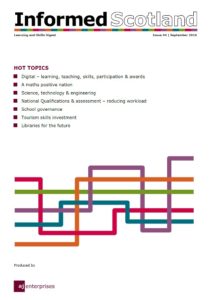
.
With the Scottish Government once again placing education as top priority in its programme for the year, and Education Scotland’s annual Scottish Learning Festival drawing the crowds, it has been another month of high profile activity.
There was a significant announcement about reducing the workload in school assessments and qualifications at National 5, Higher and Advanced Higher levels, while numerous must-read reports were published:
The Making Maths Count Group final report, Skills Development Scotland’s updated Tourism Skills Investment Plan, the first national Digital Learning & Teaching Strategy, and a Work Placement Standard for Colleges – surprisingly the first produced for the sector – from the Scottish Funding Council.
This was all in addition to the raft of annual statistical reports on equality in colleges from ECU and college leaver destinations from SFC, graduate recruits from AGR, and engineering & technology skills from IET.
More consultations and surveys are looking for your views, including on school governance, NPFS’s parental involvement in schools, General Teaching Council for Scotland’s Fitness to Teach rules, and ARC Scotland’s map of support for 14–25 year-olds with additional support needs.
Libraries made it onto the cover for the first time as they strive to adapt and develop. In Glasgow the National Library of Scotland opened a centre outside the capital at Kelvin Hall, and a Google Digital Garage has ‘popped-up’ at the Mitchell Library. North Ayrshire Council opened its third Employability Hub in Kilbirnie Library, and SLIC and Carnegie UK Trust are behind a 4-day Product Forge Future Libraries Hackathon in Edinburgh this month.
Innovations that caught our eye this month include the Cell Block Science initiative run in three HM Prisons by University of St Andrews with New College Lanarkshire, and the new Social Bite Academy offering employability skills for homeless people.
Favourite feedback this month: ‘it’s an excellent resource with a fantastic range of information’. Become an Informed Scotland subscriber so you can keep on top of all the developments. Email [email protected] to request a sample copy.
Posted by admin on September 21, 2016 ·
 by Angela Brunton, Managing Director, Be Personnel Ltd. Continuing our guest blog series featuring Informed Scotland subscribers writing on the theme Making connections across the learning & skills landscape.
by Angela Brunton, Managing Director, Be Personnel Ltd. Continuing our guest blog series featuring Informed Scotland subscribers writing on the theme Making connections across the learning & skills landscape.
I started my recruitment business ten years ago with the objective of providing the best service and experience possible, for clients and candidates alike, through partnership working. We now have several clients who have worked with us for all or most of our time in business as well as candidates who return to use our services for career moves.
My belief in partnership working has never diminished and when invited to write a guest blog addressing skills for employment from a recruitment perspective I decided to look at young people who are the focus of Education Working For All!, the final report of the Wood Commission for Developing Scotland’s Young Workforce, published in June 2014.
It found broad agreement that all of our young people are entitled to an educational experience that is relevant to the world of work, and I believe that much can still be done in employer–school/college partnerships to enhance initiatives already in place to help ensure that relevance.
Excellent strategy papers have been drafted, vast amounts of relevant statistical information collated, and working groups established to identify employer needs and skills required to get young people into work, and it is not for me to intrude into the expertise of their authors and members. However, I hope I can add some value by speaking a little about how we, the employers, could help young people stand out from the crowd in any competitive selection process.
Much has been written about links between schools and colleges and employers, the provision of work experience, careers information, advice and guidance but sometimes the missing link is practical and relevant support about how to shine in the recruitment process. Many employers provide opportunities that include work placements, apprenticeships, graduate programmes or internships – but do they get the best fit and does the young person know what to expect?
Those of you reading this are likely to span decades of different dates for your first day at work and this may influence the expectations you had as well as how you were treated, how you felt, and indeed how you would like to have been treated. My own experience was being sent up a 10 foot ladder where I had to look for and file tax returns, without any thought for my health and safety or checking to see if I was coping; my employment ended when I walked out after three days!! No doubt my actions could be regarded as childish and irresponsible, but days two and three brought no improvement or meaningful communication.
Are young people today just as likely to be treated or respond in the same way? I hope not. I don’t have all the answers but do see evidence of some young people still ill-prepared for work and employers who don’t always recognise this and are not able to provide the supportive environment needed to successfully integrate a young person into the team/company.
We are busy people; we have businesses to run, profits to make, clients and suppliers to satisfy, all of which cannot be denied, but please don’t lose sight of the fact that the school/college leavers of today are the workforce of tomorrow for all of us.
So how can we help? As a recruitment business I advise clients seeking to employ young people to begin by taking simple actions:
- Use jargon free plain language for adverts
- Advertise where young people are likely to look
- Provide a link to your company website
- Ensure an accurate description of the job
- Highlight opportunities for development and progress.
As an employer you could consider forming a partnership with a school or college in your local area to offer practical support through:
- Helping with CV writing
- Identifying skills, characteristics, traits
- Explanations about differing routes into work
- Mock interviews (telephone and face to face)
- Creating awareness of transferable skills
- Explaining clearly what you need from young employees.
The Learning to Work programme led by the Chartered Institute of Personnel and Development (CIPD) promotes the role of employers in reducing youth unemployment. CIPD also promotes direct contact with young people via youth volunteering programmes, Steps Ahead Mentoring and HR Inspiring the Future.
The Institute for Employment Studies’ research paper Young People’s Views and Experience on Entering the Workplace commissioned by ACAS can perhaps teach all of us more about the successful recruitment and retention of young people, simply by listening!
For further information contact Angela Brunton [email protected]
Website: www.bepersonneltd.com Facebook: bepersonnel Twitter: @BePersonnel
Read previous guest blogs in the series, including those from GTC Scotland, SCEL, Clyde Gateway, EDT Scotland and SCQF Partnership.
Posted by admin on September 13, 2016 ·
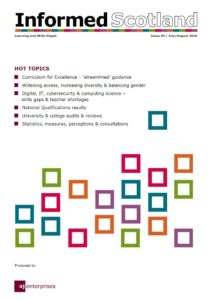
.
Curriculum for Excellence is back as a hot topic after being absent from the Informed Scotland front cover since the first issue in May 2012! New ‘streamlined’ guidance has been published to ‘liberate the teaching profession from unnecessary bureaucracy’, reigniting some old debates and initiating new ones.
In contrast, widening access and increasing diversity, and digital skills gaps and shortages continue to feature as recurring themes, affecting sectors right across the landscape.
It was pretty much business as usual throughout the summer, making for a bumper edition packed with studies, surveys, audits, statistics, exam results and consultations. In fact the Scottish Government’s Enterprise & Skills Review call for evidence and consultation on its Response to the introduction of the UK Apprenticeship Levy both started and finished over the holiday months.
There are numerous research reports to consolidate knowledge and enlighten or even surprise, including the UCAS Through the lens of students survey of how perceptions influence university applications, the Prince’s Trust’s 40 Life-changing Years report with a survey of 16–25 year-olds and a report on cybersecurity skills from Robert Half.
The word ‘new’ appears almost 50 times in this issue, including a new Network for Curriculum Studies at University of Stirling, a new Gaelic education e-Sgoil in the Western Isles, a new Gender Action Plan from Scottish Funding Council, a new website for Children’s University Scotland and several new courses, from Robert Gordon University’s online Strategic Leadership & Planning accredited by CMI, to Queen Margaret University’s MSc Play Therapy developed with With Kids.
Great feedback from a new subscriber: ‘these are going to be invaluable resources to me’. Become an Informed Scotland subscriber so you can keep on top of all the developments. Email [email protected] to request a sample copy.
Posted by admin on September 1, 2016 ·
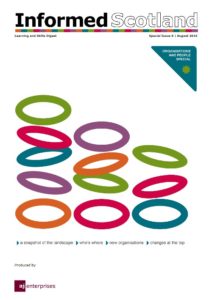
.
The fourth annual Informed Scotland Organisations & People Special has just been published to coincide with the start of the 2016–17 academic session.
It provides a snapshot of an ever-changing landscape.
Each year we add more items – this year there are links to over 280 organisations, up from 150 in the first edition in 2013.
Subscribers find it a useful directory of the main bodies and institutions operating across business, education, community & adult learning, government and wider society, including:
- Sector-specific skills bodies
- Local authority education departments
- Colleges & universities
- Teacher education institutions
- Knowledge exchange & innovation centres
There have been many changes since we published the 2015 edition – new organisations and mergers, new appointments and promotions, and retirements and closures. We’ve also enlarged the Developing the Young Workforce section to include the 14 industry-led regional groups established to-date.
Subscribers receive the Special as a bonus, in addition to their regular monthly digests. Last year’s issue prompted more great feedback: ‘I, and I am sure many others, like its comprehensive simplicity: you have assembled a list all in one place that is very useful’; ‘Another good edition’; ‘Very helpful as usual thank you’; ‘Well done!’
All new subscribers will receive a copy – find out how to join the growing list and stay well informed.
Posted by admin on August 18, 2016 ·
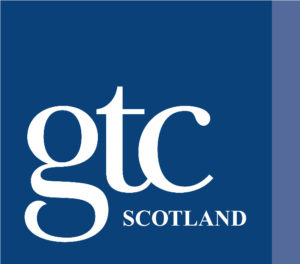 by Kenneth Muir, Chief Executive, General Teaching Council for Scotland. Continuing our guest blog series featuring Informed Scotland subscribers writing on the theme Making connections across the learning & skills landscape.
by Kenneth Muir, Chief Executive, General Teaching Council for Scotland. Continuing our guest blog series featuring Informed Scotland subscribers writing on the theme Making connections across the learning & skills landscape.
STV’s Scotland Tonight programme recently asked the question ‘What makes a good teacher?’ The programme reminded me of a visit I made a few years ago to several schools in Ontario, Canada, which is often held up as one of the best performing education systems in the world. Two things struck me at the time…
First, the extent to which all Ontario teachers were able to share the province’s relentless focus on three, easily understood priorities – improving levels of literacy, improving levels of numeracy and, perhaps surprisingly, building and enhancing the confidence of the public in the education system. It really didn’t matter with whom I spoke – school principals, senior managers, class and support teachers, even parents; all could articulate clearly what they and the education system were striving to deliver.
This focus on three priorities isn’t a million miles away from the focus in Scotland being given to literacy, numeracy and health and wellbeing in addressing the Scottish Attainment Challenge, but perhaps what is missing is the clarity given in Ontario and suggested by the new Cabinet Secretary John Swinney as being key to supporting teachers in their work and simplifying the landscape.
The third priority has particular impact – to what extent is Scotland seriously addressing the issue of talking up the teaching profession in a way that gives users of our education system, and the wider public, confidence and which attracts students to become teachers and those wishing to change career to enter the profession?
There is much that is positive about Scottish education and the public should have real confidence in the sheer hard work and dedication that Scottish teachers put into their work, day in, day out. In my view, there can be no greater responsibility and no more invigorating a career than helping give future generations of young people the skills and confidence to add real value to Scottish society. Yet, how many teachers sell their profession to the captive audience of students in their classrooms?
There are hundreds of young people leaving school each year for whom a career in teaching would be an attractive, fulfilling option. Is it time for the main organisations in Scottish education – GTCS, Education Scotland, the trade unions, SQA – led by Scottish Government to launch a public campaign to raise awareness of the commitment, and range and quality of work carried out day to day by the vast majority of teachers across the country?
Teachers I talk to find it particularly infuriating when they work hard to deliver high quality learning and teaching and all they, and their students and families, hear about are negative views being presented over and over.
This is not just a media issue. It is incumbent upon everyone in Scottish education to talk up the high quality work that is done and, despite the problems that do exist and must be addressed, such as workload and bureaucracy, use that positivity as a lever to encourage greater understanding of what being a teacher involves and encourage more people to become teachers.
In short, it’s time to take a lesson from our cousins in Canada; it’s time to talk up teaching.
For further information contact Martin Osler, Director of Communications, Digital Development and HR [email protected]
Website: www.gtcs.org.uk YouTube: GTC Scotland Twitter: @gtcs
Read previous guest blogs in the series, including those from SCEL, Clyde Gateway, EDT Scotland, SCQF Partnership and UCAS.
Posted by admin on July 5, 2016 ·
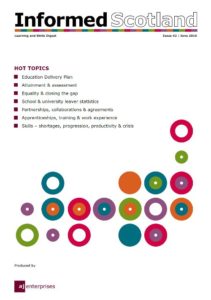
.
The Scottish Government’s new Delivery Plan for education was this month’s big item. It’s likely to remain the focus of attention for the schools sector for the foreseeable future, with proposals such as national standardised assessment and changes to local authority governance creating a stir. Unlike most documents of its type, there is very little in the way of ‘padding’ – it’s worth reading all 26 pages. However, we’ve provided our subscribers with edited extracts of the main items for ease of reference.
There are plenty of other reports to keep you occupied over the summer. Statistics include annual school and university leaver destinations, Modern Apprenticeships figures from SDS, and a new interactive data explorer from UCAS to analyse their new equality stats for individual universities.
Reports to highlight include IPPR Scotland’s Jobs and skills in Scotland, House of Commons Science & Technology Committee’s Digital skills crisis and City & Guilds Group’s Skills Confidence 2016.
It’s also been another busy month for teacher development and leadership including Scottish College for Educational Leadership’s new Training for Excellence for headteachers and Paul Hamlyn Foundation’s new Teacher Development Fund for the arts.
As it says in our blurb, Informed Scotland sets out to ‘provide intelligent summaries without political or sectoral bias’ – the June issue is no different. However, it’s hard to ignore the outcome of the EU Referendum when this month, as usual, there are numerous items involving various forms of collaboration with the EU and other EU nations. It is to be hoped that this kind of activity, and the synergistic impact and benefits it achieves, will continue whatever the future holds.
On a lighter note, a quick observation of the growing use of the word ‘literacy’. Apart from the obvious, other uses we’ve covered recently include financial, digital and emotional literacy. Add ‘ocean literacy’ to the list! To find out more, take a look at the EU funded Atlas project led by Heriot-Watt University Centre for Marine Biodiversity & Biotechnology.
Become an Informed Scotland subscriber so you can keep on top of all the developments. Email [email protected] to request a sample copy.
Posted by admin on June 10, 2016 ·
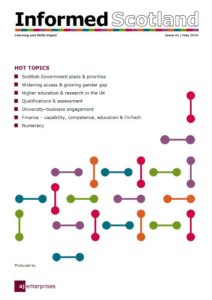
.
The best word to describe the latest issue of Informed Scotland is ‘intense’. Almost every page features an important or significant report or announcement. The increased intensity of focus on learning and skills last month was palpable, mainly – but not entirely – due to the new Scottish Government placing education at the heart of its plans.
So many reports are worth highlighting – here’s just a few to whet your appetite:
A cluster of reports focus on reducing workload associated with school assessment and National Qualifications, including the first recommendations from the Scottish Government’s Working Group, updated guidance on progression from Education Scotland, and detailed evaluations and actions from the SQA.
Then there’s the latest Scottish survey of numeracy in schools; a review of widening access to higher education in Scotland from the Sutton Trust; a report on developing teacher leadership from SCEL, a UK inquiry into financial education in schools, and a Citizens Advice Scotland study of Bridging the Digital Divide.
A UK white paper on higher education has numerous implications for Scotland, and there are two reports on university–business engagement from NCUB, including The Step Change, their Growing Value Scotland Task Force final report.
And take a close look at a HEPI report on underachievement of young men in higher education – in its foreword, UCAS Chief Executive Mary Curnock Cook states, ‘On current trends, the gap between rich and poor will be eclipsed by the gap between males and females within a decade’. An important warning not to take our eye off that particular ball.
On a lighter note, we think we’ve found the number one contender for oddest new course title of the year from SAMS UHI: ‘My Seaweed Looks Weird’… unless you know better?
This edition marks four years since the first issue of Informed Scotland in May 2012 – when youth unemployment was 23.1%, we had Standard Grades and 37 colleges, and digital wasn’t a hot topic…
Want to keep on top of all the developments? Become an Informed Scotland subscriber. Email [email protected] to request a sample copy.
Posted by admin on May 11, 2016 ·
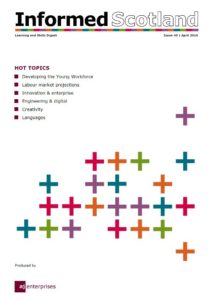
.
With political lockdown in place for the Scottish Parliament elections, April was the quietest month for a while. That said, there was no shortage of interesting developments.
Reports worth highlighting include the UK Commission for Employment & Skills’ Working Futures on labour market projections; the Institution of Mechanical Engineers’ Big Ideas on the future of engineering in schools; the Scottish Negotiating Committee for Teachers’ progress report on its review of supply teachers; and Carnegie UK’s InterAction, encouraging more and better collaboration between universities and third sector organisations.
Once again Developing the Young Workforce (DYW) was a ‘hot topic’. It was therefore interesting to discover, through conversation with a subscriber from business, that not everyone associates DYW with delivering the Wood Commission recommendations. It’s a useful reminder of the impact of names and brands on communicating messages, and of the need to take people with you when changes are made. We make no apologies therefore for a bit more name dropping from time to time!
Our subscribers are always encouraged to look beyond their natural ‘go to’ places for items – it’s not always obvious under which heading some articles should appear, especially as collaboration between sectors continues to grow. And some threads, such as digital skills, weave their way throughout the learning & skills landscape.
We also look ahead to a learning-packed week with National Digital Learning Week, Learning at Work Week and Learning Disability Week all taking place from 16th May.
Finally, congratulations to the Scottish College for Educational Leadership for selling out their inaugural conference taking place this week! Find out more about their work via the latest Informed Scotland guest blog Developing teacher leadership with SCEL – co-creating the future. All past blogs can be found here.
Want to keep on top of all the developments? Become an Informed Scotland subscriber. Email [email protected] to request a sample copy.
Posted by admin on April 25, 2016 ·

Image is © Andrew Mackie
The Scottish Parliament 2016 election will have taken place by the time we publish the April edition of Informed Scotland – too late to provide subscribers with our usual pre-election selection of relevant links.
We’ve therefore published a very brief ‘Election Extra’. It contains links to some of the manifestos and resources focusing on or highlighting learning and skills issues.
Resources include video from the GTCS Teaching Scotland and EIS Scottish Educational Journal education hustings, Education Scotland’s You decide website, and Moray House School of Education’s Election Briefings.
Manifestos include those from FSB Scotland and ScotlandIS, University & College Union Scotland and YouthLink Scotland.
Not a subscriber? Contact [email protected] for a free copy.
Become an Informed Scotland subscriber to keep on top of all the developments. Email [email protected] to request a sample copy.
Posted by admin on April 18, 2016 ·
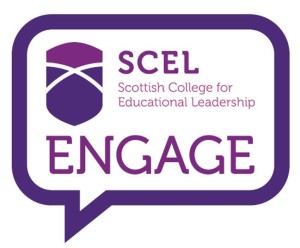 by Fearghal Kelly, Development Officer, Scottish College for Educational Leadership. Continuing our guest blog series featuring Informed Scotland subscribers writing on the theme Making connections across the learning & skills landscape.
by Fearghal Kelly, Development Officer, Scottish College for Educational Leadership. Continuing our guest blog series featuring Informed Scotland subscribers writing on the theme Making connections across the learning & skills landscape.
What actually is teacher leadership and how do we develop it? That’s the question that the Scottish College for Educational Leadership (SCEL) asked me to explore with stakeholders in Scottish education between November 2015 and March 2016.
In the planning stages I initially made the mistake of thinking that this meant I would need to begin by reading up as much as I could on ‘teacher leadership’. However, it quickly became apparent that if I was to go out and find out what others thought teacher leadership was, I needed instead to be exploring ways to carry out an engagement.
It was at this point that SCEL pointed me in the direction of U.Lab and Theory U. Theory U arose from MIT and is a way of leading change ‘by co-sensing and co-creating the emerging future’. U.Lab is a free online course led by MIT, to support practitioners from a wide range of disciplines to use Theory U to lead change.
Although I came to the U.Lab course late, it was clear that this could be of use for our engagement. I therefore set about creating workshops, discussion questions and an online approach for engaging on teacher leadership based on Theory U. You can see this approach here.
The engagement involved over 1,000 stakeholders and saw me cover over 5,000 miles across Scotland, and many of the outcomes and themes arising can be viewed on scelengage.com.
What was fascinating was that, despite some variations across the country, there were so many common themes. There was a widespread agreement that SCEL’s concept of what teacher leadership involves is broadly the right one, which is reassuring. There were also a number of common messages around what needs to be done to further develop teacher leadership, which will be useful for SCEL and others going forward.
SCEL has already launched its inaugural conference with a focus on teacher leadership, taking place on 12 May 2016, when many of the themes arising will be explored further.
What was clear to me throughout the engagement process was that basing it on Theory U had enhanced the sessions and the outcomes. It resulted in sessions which were participative and provided a professional learning experience for those involved, whilst also resulting in rich outcomes as opposed to a ‘to do list’ for SCEL.
We’re lucky to have a thriving U.Lab community in Scotland and I’m currently in the process of sharing my learning with them. If you think that Theory U could be useful in your work feel free to contact me or check out the U.Lab Scotland website.
For further information contact Fearghal Kelly [email protected]
Website: www.scelscotland.org.uk LinkedIn: SCEL Twitter: @TeamSCEL
Read previous guest blogs in the series, including those from Clyde Gateway, EDT Scotland, SCQF Partnership and UCAS.









